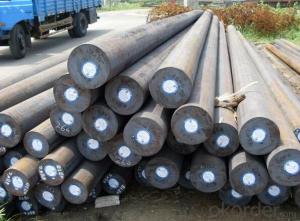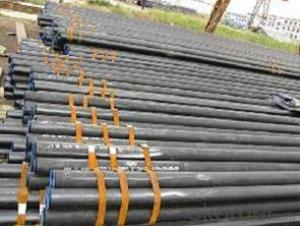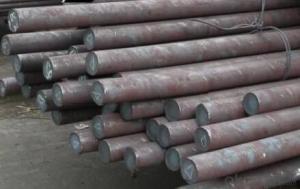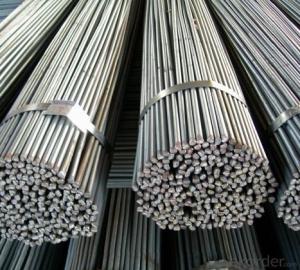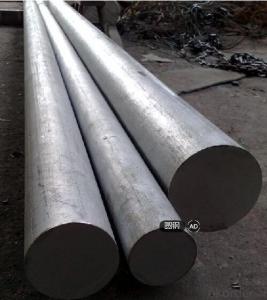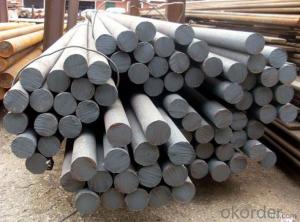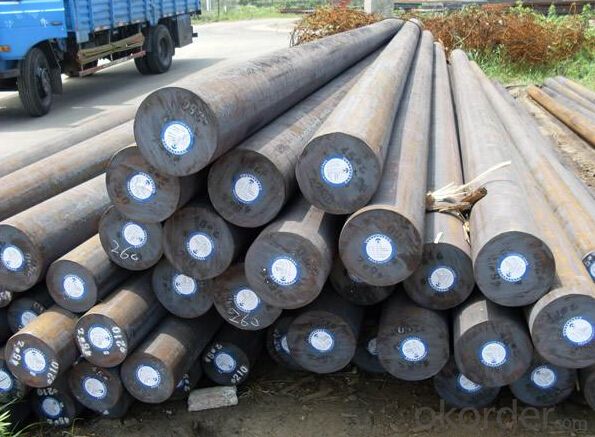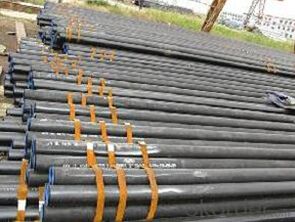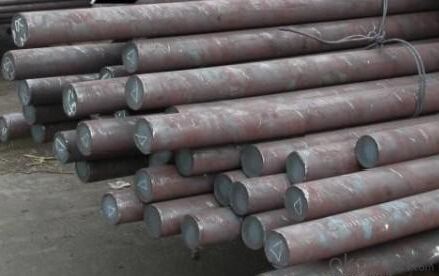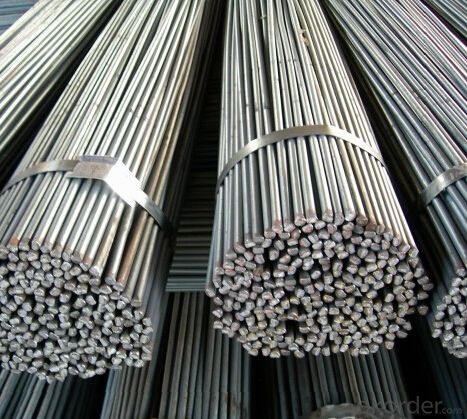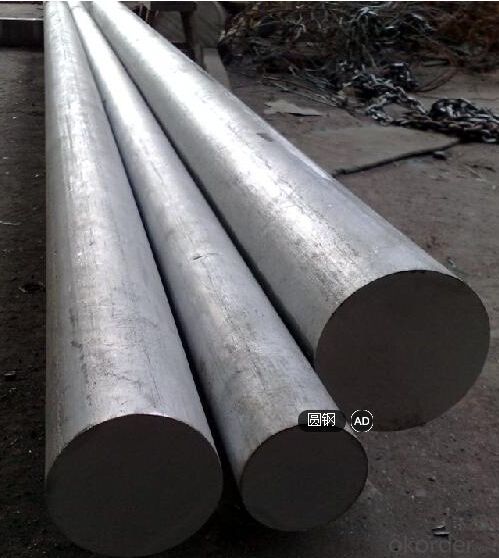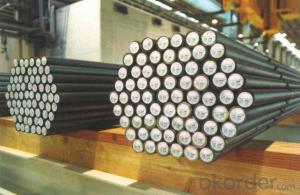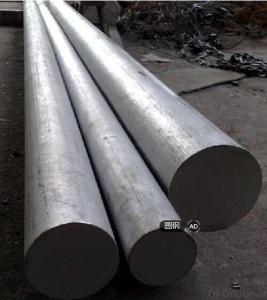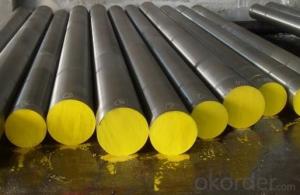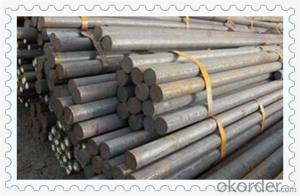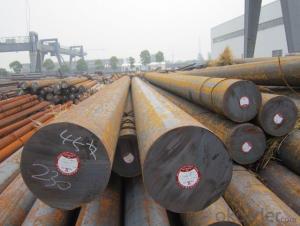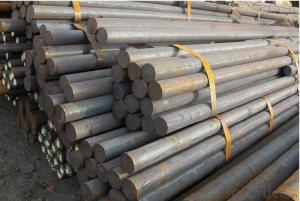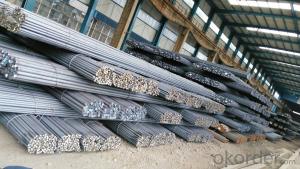Hot Work Tool Steel Round Bar Grade 1.2344
- Loading Port:
- Shanghai
- Payment Terms:
- TT OR LC
- Min Order Qty:
- 3 m.t.
- Supply Capability:
- 100000 m.t./month
OKorder Service Pledge
OKorder Financial Service
You Might Also Like
Specification
Hot Work Tool Steel Round Bar Grade 1.2344
Details Information of Hot Work Tool Steel Round Bar Grade 1.2344
| Name | Grade 1.2344 Steel Round Bar |
| Shape | Round Bar/Square Bar/Flat Bar/Plate/Wire |
| Standard | GB/ASTM/SAE/AISI/DIN/JIS/EN/BS |
| Surface Treatment: | Black/Peeling/Polished/Machined |
| Delivery Condition: | Hot Rolled or Forged/Peeled or Black Surface |
| Test | SGS/UT 100% Elements Testing |
| Certificate: | ISO/Mill Certificate |
| Service: | 24 hours online service / |
| more than 20 years trading and manufacture | |
| Quality Assurance: | the third party inspection, such as SGS, BV, TUV…etc. is acceptable |
| Packaging Details: | Seaworthy Packaging or as per customer's packing instruction |
| Carbon structure round bar | Q195 Q235A Q235B 10# 20#-55# S45CB |
| Low alloy high strength round bar | Q345A/Q345C/Q345D Q345B Q345E |
| Alloy structure round bar | SAE51B20 20Cr 40Cr 40CrV 20CrMo/30CrMo/35CrMo/42CrMo 20CrMoA/30CrMoA/35CrMoA/42CrMoA/42Cr ML20CrMo/ML30CrMo/ML35CrMo/ML42CrMo B7/SCM435-440 20MnTiB 20CrMnMo 20CrMoH 42CrMoH 40MnB/40MnBH 30Mn2-40Mn2 27SiMn 50CrVA 30CrMnTi |
| Pinion steel | 20CrMnTi 20CrMnTiH 20CrMnTiHCS/20CrMnTiHLD Q20CrMnTi-1/Q20CrMnTi-2 |
| Sucker rod | 20-35CrMoA |
| Free-cutting steel | GT1215S |
| Spring steel | 60Si2MnA 65Mn |
| Ball bearing steel | GCr15 |
Chemical Composition of Hot Work Tool Steel Round Bar Grade 1.2344
| C | Si | Mn | P | S | Cr | Ni | Cu |
| 0.17-0.24 | 0.17-0.37 | 0.35-0.65 | ≤0.035 | ≤0.035 | ≤0.25 | ≤0.25 | ≤0.25 |
| Tensile strength (σb/MPa) | Yield strength (σb/MPa) | Elongation (δ5/%) |
| ≥410(42) | ≥245(25) | ≥25 |
Company Introduction of Hot Work Tool Steel Round Bar Grade 1.2344
CNBM International Corporation is the most import and export platform of CNBM group(China National Building Material Group Corporation) ,which is a state-owned enterprise, ranked in 270th of Fortune Global 500 in 2015.
With its advantages, CNBM International are mainly concentrate on Cement, Glass, Iron and Steel, Ceramics industries and devotes herself for supplying high quality series of refractories as well as technical consultancies and logistics solution.
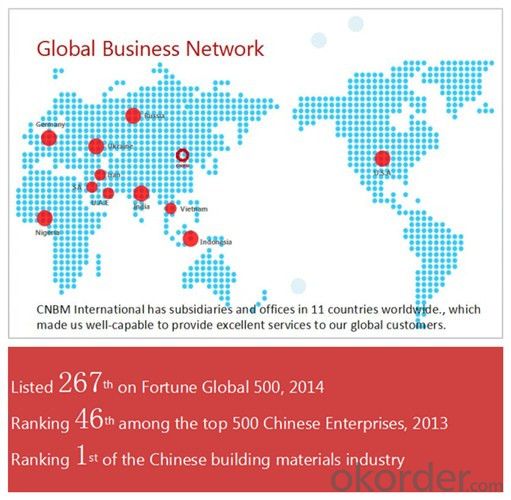
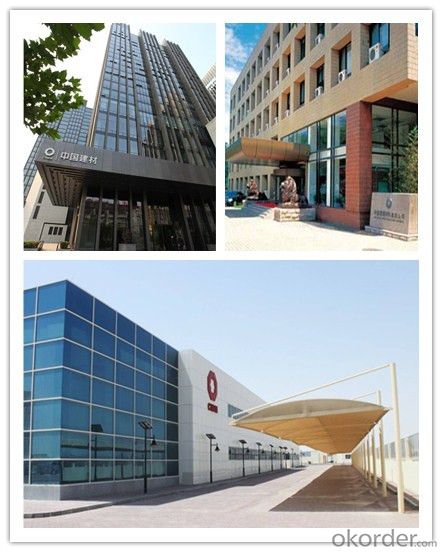
Certificates of Hot Work Tool Steel Round Bar Grade 1.2344
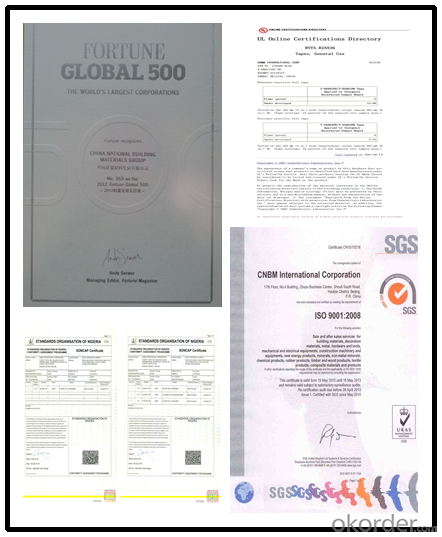
Packaging & Delivery of Hot Work Tool Steel Round Bar Grade 1.2344
Packaging Detail | Sea worthy packing /as per customer's packing instruction |
Delivery Detail | 15 ~ 40 days after receiving the deposit |
Products show of Hot Work Tool Steel Round Bar Grade 1.2344
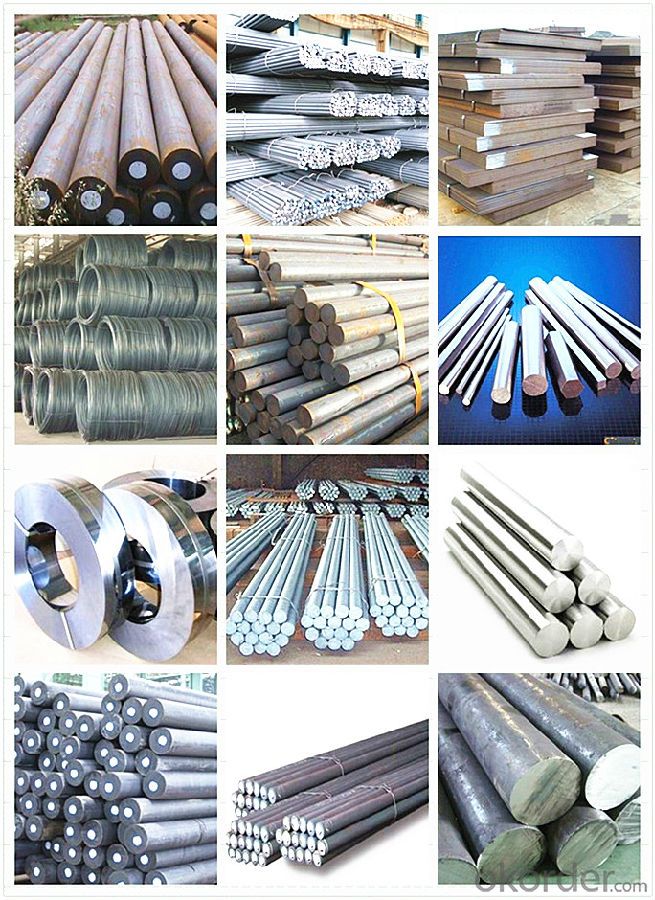
FAQ
Are you a trading company or manufacturer? | Manufacturer |
What’s the MOQ? | 3 metric ton |
What’s your delivery time? | 15-35 days after downpayment received |
Do you Accept OEM service? | Yes |
what’s your delivery terms? | FOB/CFR/CIF |
What's the Payment Terms? | 30% as deposit,70% before shipment by T/T |
Western Union acceptable for small amount. | |
L/C acceptable for large amount. | |
Scrow ,Paybal,Alipay are also ok | |
Why choose us? | Chose happens because of quality, then price, We can give you both. Additionally, we can also offer professional products inquiry, products knowledge train (for agents), smooth goods delivery, excellent customer solution proposals. |
What's your available port of Shipment? | Main Port, China |
What’s your featured services? | Our service formula: good quality+ good price+ good service=customer's trust
|
Where are your Market? | Covering more than 160 countries in the world |
- Q: How does special steel contribute to the energy storage sector?
- Special steel plays a crucial role in the energy storage sector by providing essential components for various energy storage systems. One significant application of special steel is in the manufacturing of batteries, which are essential for storing energy in various forms. Special steel is ideal for battery casings and frames due to its high strength, excellent corrosion resistance, and durability. Battery casings made from special steel can withstand high pressures and protect the internal components from external impacts, ensuring the safety and reliability of the entire energy storage system. Furthermore, special steel is utilized in the production of electrodes, a critical component of batteries. Electrodes require materials that can efficiently conduct electricity while enduring repeated charge and discharge cycles. Special steel, such as stainless steel, possesses excellent electrical conductivity and can withstand the demanding conditions within batteries, making it an ideal choice for electrode manufacturing. Additionally, special steel is employed in the construction of infrastructure for energy storage systems. Steel structures are used to support large-scale energy storage devices like pumped hydro storage facilities and compressed air energy storage systems. These structures must be strong, durable, and resistant to environmental conditions. Special steel provides the necessary strength and corrosion resistance to ensure the longevity and reliability of these energy storage infrastructure projects. In summary, special steel contributes significantly to the energy storage sector by providing essential components for batteries, such as casings and electrodes. It also plays a vital role in the construction of infrastructure for energy storage systems. With its exceptional properties, special steel enhances the safety, efficiency, and durability of energy storage technologies, thereby facilitating the growth and advancement of the renewable energy sector as a whole.
- Q: How does special steel perform in high-pressure and high-temperature environments?
- Special steel is specifically designed to perform exceptionally well in high-pressure and high-temperature environments. It possesses unique properties that enable it to withstand extreme conditions without undergoing deformation, corrosion, or failure. One of the primary characteristics of special steel is its high strength. It is engineered to have superior mechanical properties, such as excellent tensile strength, which allows it to resist the immense pressure exerted on it in high-pressure environments. This strength ensures that the steel can maintain its structural integrity and not buckle or collapse under the immense force. Furthermore, special steel is highly resistant to corrosion and oxidation, even at high temperatures. This resistance is crucial in high-temperature environments where the presence of hot gases, steam, or caustic chemicals can cause regular steel to degrade rapidly. Special steel's resistance to corrosion and oxidation ensures its longevity and reliability, making it an ideal choice for applications in such challenging conditions. Additionally, special steel exhibits excellent heat resistance. It can withstand extreme temperatures without losing its mechanical properties, such as strength and hardness. This characteristic is crucial in high-temperature environments where regular steel would weaken, soften, or even melt. Special steel's ability to maintain its structural stability even in extreme heat ensures the safety and reliability of equipment and structures operating in such conditions. Moreover, special steel is known for its excellent thermal conductivity. This property allows it to efficiently transfer heat away from the high-temperature environment, preventing localized hotspots and thermal stress. By effectively dissipating heat, special steel ensures the overall stability and performance of equipment and structures under high-pressure and high-temperature conditions. In summary, special steel performs exceptionally well in high-pressure and high-temperature environments due to its high strength, resistance to corrosion and oxidation, heat resistance, and excellent thermal conductivity. These properties make special steel a reliable and durable material for various applications, including power generation, oil and gas exploration, aerospace engineering, and many more.
- Q: What are the factors affecting the cost of special steel?
- There are several factors that can affect the cost of special steel. Firstly, the cost of raw materials used in the production of special steel, such as iron ore and alloys, can have a significant impact on its overall price. Additionally, the level of demand for special steel, both domestically and globally, can influence its cost. Factors such as market competition, economic conditions, and government policies can also play a role in determining the price of special steel. Lastly, the complexity of the manufacturing process, including the level of skill required and the use of advanced technologies, can contribute to the higher cost of special steel compared to regular steel.
- Q: What are the main alloying elements used in special steel?
- The main alloying elements used in special steel include chromium, nickel, molybdenum, vanadium, and tungsten.
- Q: What are the different non-destructive testing methods for special steel?
- There are several non-destructive testing methods that can be used to evaluate special steel materials. These methods are designed to detect any flaws or defects in the steel without causing any damage to the material itself. Some of the commonly used non-destructive testing methods for special steel include: 1. Ultrasonic Testing (UT): This method uses high-frequency sound waves to detect internal flaws or defects in the steel. Ultrasonic waves are directed into the material, and the reflected waves are analyzed to identify any discontinuities such as cracks, voids, or inclusions. 2. Magnetic Particle Testing (MT): This technique is primarily used to identify surface defects in steel. A magnetic field is applied to the material, and iron particles are applied to the surface. If there is a defect present, the magnetic field will cause the particles to cluster around the defect, making it visible for inspection. 3. Liquid Penetrant Testing (PT): PT is a widely used method to detect surface defects in special steel. A liquid dye is applied to the steel surface, and after a certain amount of time, excess dye is removed. A developer is then applied, which draws the dye out of any defects, making them visible for inspection. 4. Radiographic Testing (RT): This method involves the use of X-rays or gamma rays to examine the internal structure of special steel. The steel is exposed to radiation, and the resulting image is captured on a radiographic film or digital detector. This method is particularly effective in detecting internal defects such as porosity, inclusions, or cracks. 5. Eddy Current Testing (ECT): ECT is primarily used for surface inspection of special steel. It involves passing an electrical current through a coil that generates a magnetic field. Any variations in the magnetic field caused by defects on the surface of the steel can be detected and analyzed. These non-destructive testing methods provide valuable information about the quality and integrity of special steel materials without causing any damage. By employing these techniques, manufacturers and engineers can ensure that the steel meets the required standards and specifications, thus enhancing safety and reliability in various applications.
- Q: What are the challenges in machining high-speed special steel?
- Machining high-speed special steel poses several challenges due to its unique properties and characteristics. One of the main challenges is its extreme hardness, which makes it difficult to cut and shape. High-speed special steel typically has a high carbon content and is heat-treated to enhance its hardness, which results in increased wear on cutting tools. The high hardness of this steel also leads to increased heat generation during machining, which can cause thermal distortion and affect the dimensional accuracy of the finished product. This requires the use of specialized cooling techniques and cutting tools with advanced coatings to dissipate heat and maintain stability. Another challenge is the brittleness of high-speed special steel. It tends to have low toughness and is prone to cracking and chipping during machining operations. This requires careful selection of cutting parameters, such as cutting speed, feed rate, and depth of cut, to prevent excessive stress and minimize the risk of tool failure. Additionally, high-speed special steel often contains alloying elements like tungsten, vanadium, and cobalt, which can further complicate the machining process. These elements increase the strength and wear resistance of the steel but also make it more challenging to machine. Specialized tool materials and cutting strategies are required to effectively machine these alloys and achieve desired surface finishes. Furthermore, the cost of high-speed special steel can be significantly higher than conventional steels, which adds to the challenges of machining. The high tooling costs associated with cutting tools necessary to machine this steel can be a significant investment. Overall, machining high-speed special steel requires advanced cutting techniques, specialized tooling, and careful consideration of cutting parameters to overcome the challenges posed by its extreme hardness, brittleness, and alloying elements.
- Q: What are the different methods of surface anodizing for special steel?
- There are several methods of surface anodizing for special steel, each with its own advantages and applications. Here are some of the different methods: 1. Chromic Acid Anodizing: This method involves immersing the steel in a solution of chromic acid. It forms a thin, hard, and corrosion-resistant oxide layer on the surface of the steel. Chromic acid anodizing provides excellent adhesion for paint and other coatings, making it suitable for applications requiring enhanced durability and aesthetic appeal. 2. Sulfuric Acid Anodizing: Sulfuric acid anodizing is one of the most widely used methods. It involves immersing the steel in a sulfuric acid bath and applying a direct current to create an oxide layer on the surface. This method offers excellent corrosion resistance, increased hardness, and improved wear resistance. It also provides a good base for applying dyes or sealing to achieve various colors and finishes. 3. Phosphoric Acid Anodizing: Phosphoric acid anodizing is commonly used for stainless steel. It involves immersing the steel in a solution of phosphoric acid and applying a direct current. This process creates a protective oxide layer that improves corrosion resistance and provides a uniform matte finish. Phosphoric acid anodizing is often used for applications where a decorative appearance is not required. 4. Titanium Anodizing: This method involves anodizing steel with titanium electrodes. It creates a thick oxide layer on the surface, resulting in improved corrosion resistance, increased hardness, and enhanced wear resistance. Titanium anodizing is commonly used in industries such as aerospace, where strong and durable surface properties are essential. 5. Hard Anodizing: Hard anodizing is a specialized process that produces a thick and highly durable oxide layer on the steel surface. It involves using a higher voltage and lower temperature in the anodizing process, resulting in improved hardness, wear resistance, and electrical insulation properties. Hard anodizing is often used in applications requiring superior abrasion resistance, such as parts subjected to heavy wear or friction. These are just a few of the different methods of surface anodizing for special steel. The selection of the most suitable method depends on the specific requirements of the application, desired properties, and the type of steel being treated. It is important to consult with experts in the field to determine the optimal anodizing method for a particular steel application.
- Q: What are the different marine grades of special steel?
- There are several different marine grades of special steel that are specifically designed to withstand the harsh conditions of marine environments. These grades are typically categorized based on their corrosion resistance and mechanical properties. One of the most commonly used marine grades of special steel is 316 stainless steel. It contains a higher percentage of molybdenum and nickel, which enhances its resistance to corrosion from saltwater and other harsh chemicals. This grade is often used for marine hardware, such as bolts, nuts, and screws, as well as for marine structures and equipment. Another marine grade of special steel is 2205 duplex stainless steel. This grade has a higher strength and better corrosion resistance compared to 316 stainless steel. It is often used in marine applications that require high strength and durability, such as propeller shafts, offshore structures, and pressure vessels. There is also 5083 aluminum-magnesium alloy, which is commonly used in marine applications where weight is a concern. This grade of special steel offers excellent corrosion resistance and high strength, making it suitable for boat hulls, superstructures, and other lightweight marine components. Additionally, there are various high-strength low-alloy (HSLA) steels that are used in marine applications. These steels are specifically designed to provide superior strength and toughness while also offering good corrosion resistance. They are often used for shipbuilding, offshore drilling rigs, and other marine structures that require high strength and durability. Overall, the different marine grades of special steel provide a range of options for various marine applications. The choice of grade depends on the specific requirements of the project, including the level of corrosion resistance, strength, and weight considerations.
- Q: What are the different renewable energy grades of special steel?
- The renewable energy industry commonly utilizes various grades of special steel. These grades are specifically engineered to endure the demanding conditions and needs of renewable energy applications. Stainless steel is one of the most prevalent grades of special steel employed in renewable energy. It is renowned for its ability to resist corrosion, making it an excellent choice for offshore wind turbines and solar panel frames that are exposed to moisture and saltwater. It is also utilized in geothermal power plants, where harsh temperatures and corrosive environments exist. Another grade of special steel utilized in renewable energy is high-strength low-alloy (HSLA) steel. This type of steel possesses a higher strength-to-weight ratio, rendering it suitable for lightweight structures requiring high strength, such as wind turbine towers or support structures for solar panels. Additionally, advanced high-strength steel (AHSS), commonly used in the automotive industry, can also find application in renewable energy. AHSS offers exceptional strength, durability, and impact resistance, making it ideal for components like wind turbine blades or gears. Furthermore, weathering steel is a grade of steel frequently employed in renewable energy applications exposed to outdoor elements. This type of steel develops a protective layer of rust, which prevents further corrosion and obviates the need for additional coatings. It is commonly found in solar panel support structures, transmission towers, and other outdoor equipment. Ultimately, the choice of the appropriate grade of special steel for a particular renewable energy application relies on several factors, including the type of renewable energy source, the installation environment, and the project's specific requirements.
- Q: How does special steel perform in terms of thermal conductivity?
- Special steel typically has lower thermal conductivity compared to other materials. This means that it is not as efficient in conducting heat and may retain heat for longer periods of time.
Send your message to us
Hot Work Tool Steel Round Bar Grade 1.2344
- Loading Port:
- Shanghai
- Payment Terms:
- TT OR LC
- Min Order Qty:
- 3 m.t.
- Supply Capability:
- 100000 m.t./month
OKorder Service Pledge
OKorder Financial Service
Similar products
Hot products
Hot Searches
Related keywords
